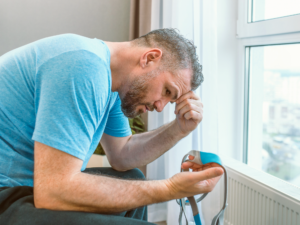New Study Finds Work-Sponsored Program Boosts Sleep and Productivity

Both in-person and work-from-home employers are increasingly implementing programs like step counting, meditation, and hydration challenges aimed at improving employee health and boosting morale. A study published in October 2023 investigated whether an employer’s sleep improvement program could effectively enhance employees’ work productivity and sleep health.
The study took place at a Japanese manufacturing company over 6 months. Some 215 employees signed up for the program and were split into two groups, a treatment group that tracked their sleep and a randomized control group that did not.
The treatment group used a sensing device that rests under a bed mat and relays sleep data to a smartphone app. The device measured heart rate and movement to determine sleep latency, number of awakenings, time slept, and minutes spent in REM sleep. After the first week, the treatment group was given feedback on how to improve their sleep. The tracking results found that the treatment group improved their sleep compared to the control group.
Before and after the trial, both groups also completed surveys that recorded their sleep satisfaction, overall mood, number of hours worked, and daytime sleepiness. Before the trial, the two groups had no significant differences in responses. After the trial, the treatment group rated these factors higher or better than the control group, suggesting the sleep-improvement program worked for the treatment group.

Results also indicate that the treatment group had better work productivity than the control group. Members of the treatment group who carefully tracked their sleep and used the feedback to improve their sleep increased overall productivity, time management, and work output. There was no significant change in physical labor tasks. Using a formula developed for the study, scientists estimated that improved employee sleep could translate to an economic benefit of up to $101,500 per year for this particular workplace.
Even so, the study authors acknowledged certain limitations. Participants were white-collar, day-shift workers within the company, and there is no data showing that shift workers or manual laborers could expect the same results.
Additionally, the employees opted into the program with the goal of improving their sleep. The results may have been skewed because the groups weren’t made up of random employees but a self-selected cohort wanting to better their sleep.
Despite these limitations, both employers and employees stand to gain from a job-sponsored sleep program. Employers can improve productivity by identifying employees looking to enhance their sleep health and providing high-quality sleep-tracking tools and technology.
Though employees may be less concerned about increasing work output, job-sponsored sleep tracking is an attractive and seemingly effective way to boost sleep health on the company’s dime.
Got a hot tip? Pitch us your story idea, share your expertise with SleepFoundation.org, or let us know about your sleep experiences right here.
References
3 Sources
-
Song, Z., & Baicker, K. (2019). Effect of a Workplace Wellness Program on Employee Health and Economic Outcomes. JAMA, 321(15), 1491–1501.
https://jamanetwork.com/journals/jama/fullarticle/2730614 -
Rubery, P. T., Ramirez, G., D’Agostino, C. R., Vasalos, K., & Thirukumaran, C. (2022). A workplace wellness program at an academic health center influences employee health, satisfaction, productivity and the rate of workplace injury. International Archives of Occupational and Environmental Health, 95(7).
https://pubmed.ncbi.nlm.nih.gov/35501508/ -
Kawata, Y., Kuroda, S., & Owan, H. (2023). The impact of a mobile app-based corporate sleep health improvement program on productivity: Validation through a randomized controlled trial. PLOS ONE, 18(10), e0287051–e0287051.
https://journals.plos.org/plosone/article?id=10.1371/journal.pone.0287051














































































































































